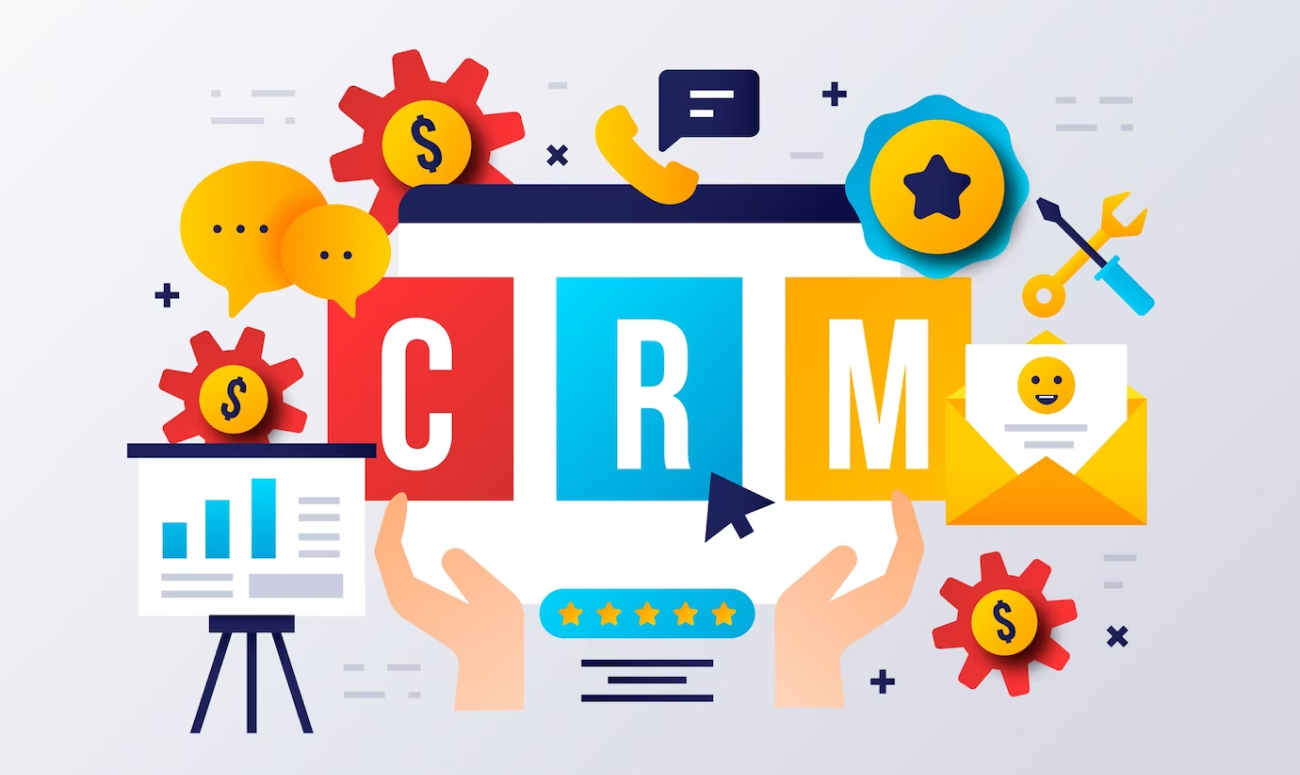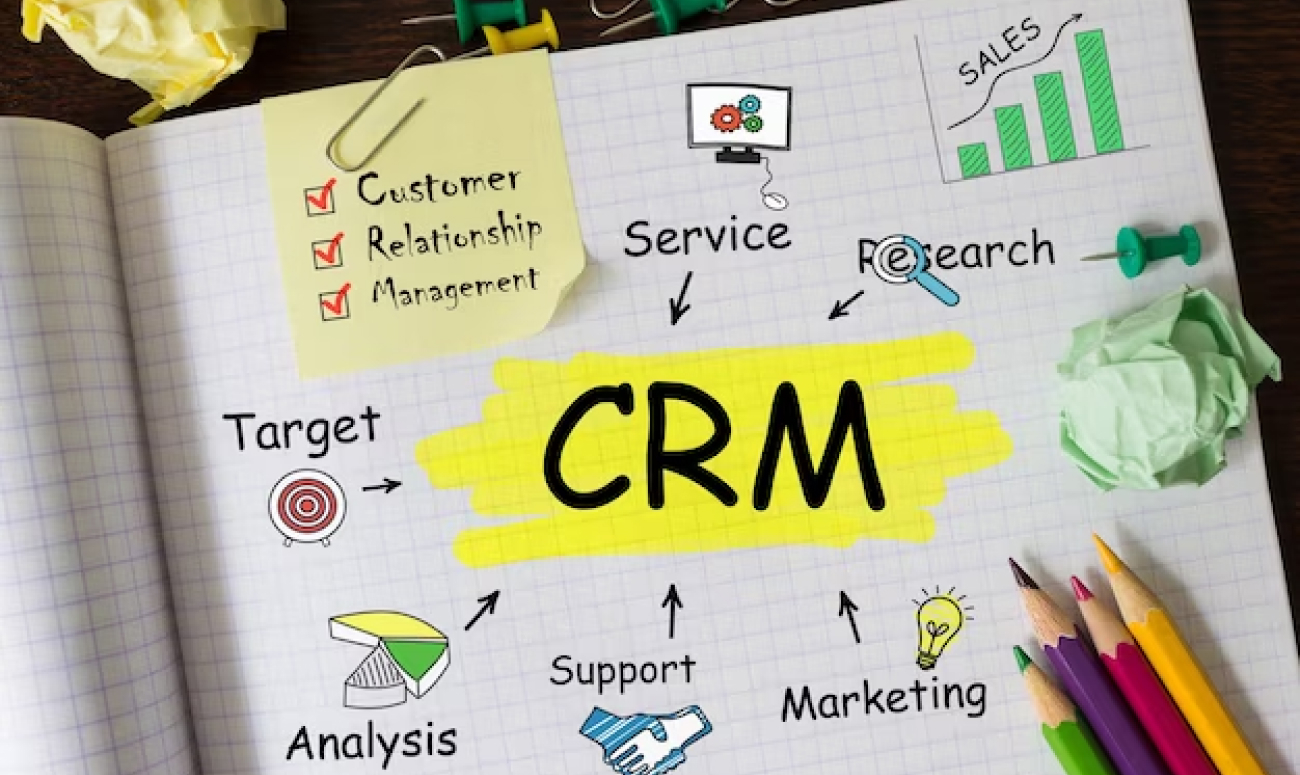
Do you need help to get your sales and marketing teams working together? If so, it’s time to find a way to bridge the gap between both departments. A great way of doing this is by implementing Customer Relationship Management software. CRMs can help business owners optimize campaigns and strengthen customer relationships through enhanced collaboration, improved analytics, automated workflows, and access to meaningful customer data – all within an easy-to-use interface. This post will discuss how effectively using a CRM can reduce confusion between both teams while increasing productivity and improving overall performance.
Importance of Collaboration between Sales and Marketing Teams for Business Success
For any business to succeed, both teams must work together effectively. Sales team members are the ones who interact directly with customers, while marketing team members develop strategies, create content, and analyze customer data. Without cooperation between both departments, it isn’t easy to understand what customers want and how best to market your product or services.
Why Sales and Marketing teams need to work together
Sales team
The sales team focuses on persuading potential customers to purchase and maintaining relationships with existing ones by communicating with them through different mediums. The sales team includes sales representatives, account managers, and sales executives. As a result, it can close more deals and generate revenue for the business.
Marketing team
On the other hand, the marketing team focuses on promoting the business, increasing brand awareness, and generating leads for the sales team. In addition, they create marketing strategies, develop marketing materials, and manage social media and advertising campaigns.
Sales cannot generate revenue without leads from marketing, and the marketing team cannot generate revenue without a sales team to close deals. When these teams collaborate effectively, they can create a seamless pipeline for leads and sales, resulting in increased revenue.
One example of this collaboration is through lead generation campaigns. The marketing team can develop targeted email campaigns or through marketing automation tools to attract potential customers, and then the sales teams can follow up with those leads to close deals. Businesses can evaluate this close working relationship between the two units using various business metrics, such as conversion rates and customer lifetime value.
Another example is through tracking and analyzing customer data. The marketing team can use analytics tools to track the success of marketing campaigns and then share that information with the sales team to help them tailor their sales pitch to specific customers. In turn, the sales reps can provide feedback on customer interactions with targeted campaigns, allowing the marketing team to improve messaging and targeting through better marketing strategy.
Both teams are crucial in driving revenue. Working together can create a seamless process that increases revenue and customer retention. In addition, the collaboration of these teams can be evaluated using various metrics and allows the business to adapt to changing trends and customer behaviors.
How collaboration benefits both Sales and Marketing teams

Collaboration is essential for successful business operations, and this is especially true for sales and marketing teams. The following points elaborate on how coordination benefits both teams:
Increased Efficiency
One of the primary benefits of collaboration between both the sales team and the marketing team is increased efficiency. When both groups work together towards common goals, they can eliminate duplicate efforts and utilize each other’s strengths to achieve results more quickly.
Improved Communication
Another benefit of collaboration between both teams is improved communication. By working together, both teams can ensure everyone is on the same page regarding objectives, strategies, and tactics. That can help to avoid misunderstandings and miscommunication that could lead to problems down the road. A CRM system is essential for managing centralized customer data and ensuring that the CRM systems are updated with relevant information in real time, thus avoiding conflicts and confusion.
Enhanced Creativity
Collaboration between sales and marketing teams can also lead to enhanced creativity. Collaborative efforts between teams are vital for small businesses with limited resources. When both teams are involved in the creative process, they can bring different perspectives and ideas to the table, resulting in more innovative and effective marketing campaigns.
Greater Flexibility
Another advantage of collaboration between both teams is greater flexibility. When both teams work together, they can be more flexible in their approach to meeting goals. This flexibility can allow them to be more responsive to market or customer needs changes and make adjustments accordingly.
Improved Morale
Finally, a collaboration between the sales team and the marketing team can improve the morale of both groups. Employees who feel like they are part of a team working towards common goals are more likely to be engaged and motivated. That can lead to improved performance and higher job satisfaction levels.
Better qualified leads
Sales and marketing can generate better-qualified leads by working together. By combining the insights from both teams, they can develop a strategy targeting the right people with the most relevant messaging. This strategy will result in more engaged customers who can convert into paying customers.
Improved customer service
By leveraging the insights of both teams, they can provide clients with a more personalized experience tailored to their needs and interests. That will result in happier and more loyal customers who are more likely to continue doing business with the company providing customer satisfaction.
Generate New Leads: Effective collaboration between both teams enables them to generate new leads by leveraging their unique expertise. For example, marketing teams can design landing pages optimized for lead generation and use email marketing tools and marketing automation platforms to distribute content to potential customers. Meanwhile, sales teams can work on lead management by qualifying leads based on specific criteria that optimize the conversion to sales.
In conclusion, collaboration can benefit both teams by streamlining operations, enhancing customer satisfaction, and improving lead generation using sales and marketing tools.
Introduction to Sales and Marketing CRM

Sales and Marketing CRM software, or CRM platform, is a powerful tool for streamlining both processes to improve productivity. These systems automate buying from lead generation to email campaigns and sales reporting. Marketing channels are also simplified as they can be managed directly within the software, allowing companies to understand their customer base quickly. In addition, this type of software enables businesses to nurture relationships with customers while tracking performance metrics such as conversion rates and return on investment. For example, a company may use marketing CRM and marketing automation software to identify leads that have not engaged or have ceased operation to obtain more profound insight into the customer journey.
What is a Sales and Marketing CRM?
A Sales and Marketing system or CRM, or customer relationship management(CRM) system, is a type of software businesses utilize to manage their interactions and relationships with customers and potential customers. The primary purpose of a CRM is to improve sales and marketing efforts by analyzing customer information and tailoring strategies to each customer, enabling businesses to provide personalized marketing and sales messages that resonate with each customer.
A Sales and Marketing CRM is a central repository for contact management where businesses can track and store customer data such as contact information, purchase history, leads, and customer feedback. With this information, companies can segment their customer base and identify sales opportunities, create targeted marketing campaigns, create lead generation, and follow-up, and improve customer engagement and satisfaction.
For example, a business that sells luxury skincare products could use a sales and marketing CRM to identify its high-spending customers and offer exclusive discounts or early access to new products. They could also use the same CRM email marketing automation tools to track customer feedback and adjust their messaging to address common concerns or pain points.

According to a recent study by Salesforce, businesses that use a CRM have seen a 37% increase in sales revenue, a 45% improvement in customer retention, and a 43% increase in customer loyalty. These metrics show that businesses can use CRM to grow their revenue and build lasting relationships with their customers.
In conclusion, a Sales and Marketing CRM is a critical tool for businesses to manage customer interactions effectively. With the ability to track all customer interaction data, segment customers, and deliver targeted messaging, companies can improve their efforts, increase customer engagement and satisfaction, and ultimately drive business growth.
How can it help Sales and Marketing teams work together?
Using a Sales and Marketing CRM has become more critical than ever. Customers are now more digitally savvy, and the pandemic has forced businesses to adapt to a more online-centric environment. With more customers moving online, companies must be able to understand their customer’s needs and deliver personalized messaging and experiences to keep them engaged.
All businesses must efficiently handle sales and marketing to keep up with changing trends (including small businesses). CRM helps both teams to work together to grow businesses. It provides automated email templates which enable companies to send personalized messages to their contact list quickly. Not only does this save time for marketers, as they don’t need to draft individual emails each time, but it will also produce higher quality results as the content sent out is optimized with the best CRM data available.
Sales automation tools and email marketing automation tools are essential for small businesses to optimize their sales process and sales pipeline. CRM offers a suite of features that help streamline communication between Sales and Marketing teams, allowing them to understand better customer needs, preferences, and purchasing history. In addition, the marketing features of CRM target customers with relevant marketing messages or offers based on their past purchases or interests. By bringing sales and marketing efforts together into one unified platform, small businesses can increase efficiency and build stronger relationships with their customers.
Ultimately, a reliable CRM is the key to success in today’s online environment where customers are constantly bombarded with email marketing material.
Overview of popular Sales and Marketing CRM tools in the market

Small businesses have various options for a Sales and Marketing CRM solution. Some popular choices include :
EQUP
EQUP is the most affordable unified CRM platform that helps sales teams better manage customer relationships. The tool includes contact management, lead tracking, and sales pipeline management. Additionally, EQUP integrates with the rest of the EQUP marketing platform, which provides users with a complete view of their customer’s journey. It offers various additional features like inventory pooling, industry-specific features, and free access to most components to help small businesses grow.
Pipedrive
Pipedrive is a robust CRM for small businesses looking to streamline their entire sales process. Not only does it provide customers with an intuitive visual pipeline, but it also gives users the ability to track their progress from lead generation to post-sale relationships. Additionally, cutting-edge algorithms allow users to predict their upcoming deals so they can adjust their strategies accordingly. By considering all of these factors, Pipedrive makes it much easier for businesses to manage their sales pipeline and maximize revenues.
Active Campaign
Active Campaign is a robust CRM platform that helps businesses build stronger customer relationships. It provides users with advanced automation tools to track customer behavior and activities, allowing companies to adjust their strategies accordingly. Active Campaign offers features specifically designed for small businesses, such as customer segmentation and customer profile management.
Freshsales
Freshsales is an excellent sales and marketing CRM platform that helps businesses identify unique sales opportunities, streamline the customer journey through interactions and contact data, and make email templates to create personalized emails. With a specialized set of CRM solutions, it’s easy to leverage the power of advanced analytical tools, segmented targeting capabilities, automated workflows, and other performance-enhancing features. All this ensures businesses can cultivate better customer relationships while utilizing the right combination of sales and marketing strategies.
Strategies for Implementing a Sales and Marketing CRM

Once a Sales and Marketing CRM is selected, developing strategies for implementing the tool is crucial. The following tips will help small businesses make the most of their Sales and Marketing CRM:
Identifying key business objectives and requirement
Before implementing sales or marketing customer relationship management, you must identify your objectives. What are you hoping to achieve with your CRM? Do you want to increase sales, improve customer retention, or do something else?
Once you know your objectives, you need to identify the requirements for your CRM. What features will you need to achieve your goals? For example, you will need a CRM with features that will help you track leads and manage customer relationships to increase sales. To improve customer retention, you will need a CRM with features that will help you track customer interactions and follow up with customers after they make a purchase.
Selecting the right CRM tool for your organization

There are many different CRMs on the market, so choosing one that meets your specific needs is vital. Be sure to read reviews and compare pricing before making a decision.
Steps in Selecting the Right CRM Tool for Your Organization:
1. Assess and Identify Your Needs: Before selecting a CRM tool, assessing and identifying your organizational needs is essential. Start by determining what features you need to achieve your objectives. For example, if you want to increase sales, you will need a CRM with lead-tracking capabilities. If customer retention is a priority, look for a CRM with features that can help you track customer interactions and follow up with customers after they purchase.
2. Available Research Options: After identifying your needs, research the available options on the market. Read reviews of different tools and compare pricing before making a decision. Consider ease of use as well as scalability when evaluating other vendors. Also, look into integration capabilities – this is key if you connect multiple systems for a seamless customer experience.
3. Test Out Different Software: Once you have identified which software products meet your needs, testing out different software versions before committing to one option is essential. Make sure it meets all your requirements, and try out its features to ensure it fits your organization correctly.
Developing a training plan for Sales and Marketing teams

When selecting a CRM software product, take advantage of any support services offered by the vendor or third-party providers, such as training sessions and tutorials.
This training ensures that everyone on your team has the necessary skills and resources to succeed with the system once it is implemented within your organization. They should understand how to input data and how to use the various features of the CRM. If they are not adequately trained, they cannot get the most out of the system.
Monitor and adjust as needed.
Finally, once you have implemented your sales or marketing CRM, monitoring it closely and making necessary adjustments is essential. It would help to track metrics such as sales, customer satisfaction, and customer retention rates to see how well the system works for you. If you are still looking for the desired results, feel free to make changes until you find a system that works for your business.
By selecting the right sales CRM and marketing automation tool, and effectively implementing it, small businesses can make considerable strides in staying ahead of their competition. The tips above will help them start this journey and ensure they are making the most of their Sales and Marketing CRM. In addition, small businesses can benefit from improved team sales collaboration with the right strategy.
Metrics for Measuring the Success of Sales and Marketing Collaboration using CRM

Measuring the success of sales and marketing collaboration using Customer Relationship Management (CRM) is crucial for businesses seeking to optimize customer relationships and boost revenues.
One critical metric used to gauge the success of sales and marketing collaboration using CRM is conversion rates. Conversion rates measure the ratio of leads generated to the number of successful sales made.The collected data ensures that both teams are on the same page when engaging potential customers, increasing conversion rates.
Another essential metric for measuring the success of sales and marketing collaboration with CRM is revenue growth. Revenue growth measures the increase or decrease in sales over a specific period, allowing businesses to monitor the impact of their sales and marketing strategies. Through CRM, companies can track the effectiveness of their campaigns, allowing them to make necessary adjustments for better results.
A study shows, Aligning sales and marketing can help businesses close transactions 67% more effectively.
CRM data provides visibility on customer churn and insight into customer segmentation and campaign performance. Collecting actionable intelligence across sales and marketing operations enables leaders to assess whether collaboration is effective. By monitoring activity tracking, such as emails sent or calls made, it’s possible to create meaningful dashboards which measure overall performance. An effective CRM will put valuable insights into the hands of business leaders for data-driven decisions on sales and marketing initiatives that contribute to success.
For instance, using social media metrics can help businesses understand consumer behavior and interests and guide messaging and branding efforts. Companies can also employ market trend analysis to monitor their industry’s direction and identify growth opportunities.
In conclusion, measuring the success of sales and marketing collaboration using CRM is crucial for optimizing customer relationships and growing revenue. Critical metrics such as conversion rates and revenue growth help businesses monitor the effectiveness of their sales and marketing strategies. Additionally, using activity tracking metrics helps companies better understand their market, competition, and consumer behavior trends, allowing them to make informed decisions on product development and positioning.
Stay ahead of the curve with the best CRM tool.
Keeping up with the ever-changing trends of today’s technological and customer service landscape is essential to success in any business. Therefore, staying ahead of the curve is crucial to offer your clients the best time and money-saving solutions and ensure that your company operates efficiently and productively.
The best way to ensure you can keep up with these changing trends is by leveraging a CRM (Customer Relationship Management) system that should collaborate with your business operations. Adopting a CRM tool can help you automate workflows while simultaneously promoting collaboration between sales, marketing, and customer service will help you stay ahead.
Utilize a CRM and develop sustainable strategies for your small business moving forward. Make sure that it provides features such as closed-loop reporting, automated workflow processes, and more to get the best performance from your team. So, please take the necessary steps to ensure you utilize modern technology and take advantage of its benefits. Such measures will guarantee a future full of great potential for your small business now! Ready to start? Click here for the ultimate sales and marketing CRM and watch how quickly things start changing for your operations!